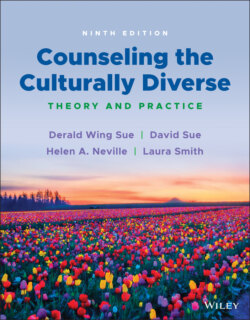Читать книгу Counseling the Culturally Diverse - Laura Smith L. - Страница 82
SCIENTIFIC EMPIRICISM
ОглавлениеCounseling and psychotherapy in Western culture and society have been described as being linear and analytic in attempting to model themselves after the physical sciences. As mentioned in Table 3.1, Western society tends to emphasize the scientific method, which involves objective, rational, linear thinking. In using linear thinking, we follow set steps in a particular order in the belief that this well‐defined progression leads inevitably to one proper conclusion. Accordingly, we often see descriptions of good therapists as objective, neutral, rational, and logical (Utsey, Walker, & Kwate, 2005), language that calls to mind this linear paradigm. Therapists are frequently trained to rely heavily on the use of linear problem solving, as well as on quantitative evaluation that includes psychodiagnostic tests, intelligence tests, personality inventories, and so forth. In other words, theories of counseling and therapy are analytical, rational, and verbal in nature, and they stress the discovery of cause–effect relationships.
Relatedly, in the mental health fields, the predominant way of asking and answering questions about the human condition tends to involve the scientific method. The epitome of this approach is the experiment. In graduate school, we learn that reliance upon controlled experiments allows us to impute cause–effect relationships. By identifying independent and dependent variables, and controlling for extraneous ones, we are able to test our cause–effect hypotheses. Although correlational studies, historical research, and other approaches may be of benefit, we are assured that the experiment represents the ultimate approach to knowledge creation. Other cultures, however, often value different ways of asking and answering questions about the human condition, and different ways of representing knowledge (as do qualitative, feminist, and participatory researchers within American scholarship).
Experiments, linear thinking, and problem‐solving are not inherently problematic, of course; when applied within an appropriate context, they are useful tools. Rather, the problem is that the life experiences and feelings of diverse human beings and communities are often not the appropriate context. Moreover, an emphasis on symbolic logic contrasts markedly with the philosophies of many cultures that live according to a more nonlinear, holistic, impressionistic, and harmonious approach (Sue, 2015). For example, American Indian worldviews emphasize harmonious aspects of the world, intuitive functioning, and a holistic approach—a worldview characterized by creative activities and understandings rather than analytical frameworks. Thus, when American Indians participate in therapy, a distinctly analytic approach may clash with their basic philosophy of life (Garrett & Portman, 2011) and lead conventional linear‐thinking therapists to erroneous conclusions about them.
